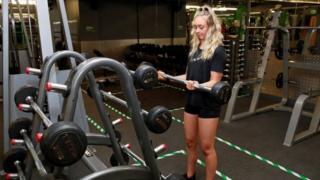 Image copyright
Reuters
Image copyright
Reuters
Indoor gyms, swimming pools and sports facilities in England have started to reopen in the latest easing of the coronavirus lockdown.
But the leisure sector has warned it will still struggle because of the financial impact of the pandemic.
At least a third of public facilities are expected to remain shut.
Gyms must follow strict hygiene and social distancing measures, such as limiting the number of people using the facility and spacing out equipment.
Facilities should also reduce class sizes and ensure adequate ventilation, according to government guidance issued earlier this month.
Swim England has published separate guidance for operators on how to reopen indoor pools, including implementing a one-way entry and exit system.
Indoor gyms in Northern Ireland opened earlier this month, but they remain closed in Scotland and Wales.
Meanwhile, Health Secretary Matt Hancock has confirmed gyms and sports facilities will not reopen in Luton or Blackburn with Darwen due to an increase in coronavirus cases in those areas.
Outdoor gyms and pools have been open in England since 4 July because there is less risk of catching coronavirus in the fresh air.
Analysis
By Katy Austin, BBC News business correspondent
Will people come back to gyms, pools and leisure centres? After spending time and money preparing their facilities, that's the question on the minds of those who run venues.
Confidence is crucial - how safe people feel, and how much they're prepared to spend at a time of economic uncertainty.
Like other industries, fitness businesses have taken a financial hit. A report from trade body UKActive said membership cancellations rates were 15- 23% due to the impact of the pandemic.
Some fitness professionals have adapted by introducing online classes and personal training, which have proved popular.
But UKActive says although today is an important milestone, the sector is "not yet out of the woods".
It says support will still be needed with costs such as back-dated rent in coming months, and some facilities and services will remain closed due to the ongoing financial pressures and restrictions.
Despite the relaxed rules, industries bodies have warned many facilities could be forced to close amid the pandemic.
Community Leisure UK, the members' association that specialises in representing charitable leisure and culture trusts across England, Scotland and Wales, estimates that 48% of all public leisure facilities face closure, meaning as many as 1,300 could disappear by the end of the year, along with more than 58,000 jobs.
The organisation said about a third would not be able to reopen on Saturday due to the increased costs resulting from lost income during lockdown and due to operating at reduced capacity.
"The main reason is financial viability, because as with all of the high streets and services - zero income since the end of March," Mark Tweedie, chief executive of Community Leisure UK, said.
The District Councils' Network (DCN) is also warning of the "uncertain future" faced by gyms and leisure centres, pointing out that the sector is expected to lose about £305m this year.
The DCN, which represents 187 district councils in England that provide leisure services, is calling on the Treasury to provide a rescue package to save leisure centres from collapse.
Leisure centres and indoor gyms, along with swimming pools and other indoor sports facilities have been closed since 21 March as part of measures to prevent the spread of coronavirus.

 5 years ago
528
5 years ago
528 

